- Home
- Haruki Murakami
Men Without Women Page 3
Men Without Women Read online
Page 3
A fine rain began to fall. Misaki turned on the wipers. “So then did you figure it out? Why your wife slept with him?”
“No.” Kafuku said, shaking his head. “I never understood. He had some qualities that I lacked. All right, a lot of qualities, I guess. But I could never figure out which of those had caught her fancy. Our actions aren’t based on specifics like that—we can’t pinpoint why we do what we do. Relationships between people, especially between men and women, operate on—what should I say—a more general level. More vague, more self-centered, more pathetic.”
Misaki thought for a moment. “But still,” she said, “you stayed friends with him even though you didn’t understand, right?”
Kafuku took off his baseball cap again and placed it on his lap. “It’s hard to explain,” he said, rubbing the top of his head with his palm. “Once you really get into a role, it’s hard to find the right moment to stop. No matter how it preys on your emotions, you have to go with the flow until the performance has taken its shape, the point where its true meaning becomes clear. It’s the same with music. A song doesn’t reach a proper end until it arrives at a final, predetermined chord. Do you understand what I mean?”
Misaki drew a Marlboro from her pack and placed it between her lips. But she never smoked when the top was up, and it stayed unlit.
“So was the guy still sleeping with your wife when you were friends?”
“No, he wasn’t,” said Kafuku. “If he had been, it would have made things, how should I say…too complicated. We became friends not long after my wife’s death.”
“So were you real friends? Or was it all just acting?”
Kafuku thought for a while. “It was both. It’s gotten so I have a hard time drawing a clear line between the two. In the end, that’s what serious acting is all about.”
—
From the beginning, Kafuku had been able to feel something approaching affection for the man. His name was Takatsuki, and he was a tall, good-looking fellow, the classic romantic lead. He was in his early forties and not an especially skilled actor. Nor did he have what one could call a distinctive presence. His range of roles was limited. As a general rule, he played nice guys, although sometimes a touch of melancholy would cloud his otherwise cheerful profile. He had a loyal following among middle-aged women. Kafuku bumped into him on occasion in the green room at the TV studio. Some six months after his wife’s death, Takatsuki came up to introduce himself and express his condolences. “Your wife and I were in a film together once. I owed her a lot,” Takatsuki said humbly. Kafuku thanked him. As far as he knew at that point, chronologically speaking, this man was the last of his wife’s string of lovers. It was soon after the end of their affair that his wife had gone to the hospital for tests and been diagnosed with advanced uterine cancer.
“Forgive me, but I’d like to ask a favor,” Kafuku said when the formalities had concluded. This was his chance to broach what he had in mind.
“Is there something I can do?”
“If it’s all right with you, I’d like you to grant me some of your time. To talk about my wife. Maybe have a few drinks and remember her together. She often spoke of you.”
Takatsuki looked surprised. Perhaps shocked would be more accurate. His immaculate eyebrows inched together as he cautiously studied Kafuku’s face. He seemed to be trying to discern what, if anything, might lie behind the invitation. But he could read no intent in the older man’s expression. All he saw was the kind of stillness you might expect from someone who had recently lost his wife of many years. Like the surface of a pond after the ripples had spread and gone.
“I was only hoping to talk about my wife with someone who knew her,” Kafuku added. “To tell the truth, it can get kind of rough when I’m sitting at home all by myself. I know it’s an imposition on you, though.”
Takatsuki looked relieved. His relationship with the man’s wife did not seem to be under suspicion.
“It’s no imposition at all. I’d be happy to make time for something like that. I just hope I won’t bore you.” A faint smile rose to his lips as he said these words, and the corners of his eyes crinkled with compassion. An altogether charming expression. If I were a middle-aged woman, thought Kafuku, my cheeks would be turning pink right now.
Takatsuki mentally flipped through the schedule he kept in his head. “I think I have plenty of time tomorrow night. Do you have other plans?”
Kafuku replied that he was also free then. He was struck by how easy it was to read Takatsuki’s emotions. The man was transparent—if he looked into his eyes long enough, Kafuku thought, he could probably see the wall behind him. There was nothing warped, nothing nasty. Hardly the type to dig a deep hole at night and wait for someone to fall in. But neither, in all likelihood, was he a man destined to achieve greatness as an actor.
“Where shall we meet?” asked Takatsuki.
“I leave it to you,” Kafuku said. “Tell me a place, and I’ll be there.”
Takatsuki named a well-known bar in Ginza. He would reserve a booth, he said, so that they could talk frankly without having to worry about being overheard. Kafuku knew the spot. They shook hands goodbye. Takatsuki’s hand was soft, with long slender fingers. His palm was warm and slightly damp, as if he had been sweating. Perhaps he was nervous.
After he left, Kafuku sat down on a chair in the green room, opened his right hand, and stared hard at his palm. The sensation left by the handshake was still fresh. That hand, those fingers, had caressed his wife’s naked body. Slowly and deliberately, exploring every nook and cranny. He closed his eyes and breathed deeply. What in heaven’s name was he trying to do? He felt that whatever “it” was, he had no choice but to go ahead and do it.
—
As he sipped single malt whiskey in the booth at the bar, Kafuku came to one conclusion. Takatsuki was still deeply attached to his wife. He had not yet grasped the immutable fact of her death, that the flesh he had known had become a pile of charred bone and ash. Kafuku could understand the way he felt. When Takatsuki’s eyes grew misty recalling her, he wanted to reach out to console him. The man was quite incapable of hiding his emotions. Kafuku sensed that he could trip him up with a trick question if he so chose, induce him to confess everything.
Judging from the way Takatsuki spoke, Kafuku’s wife had been the one to call a halt to their affair. “It’s best we not meet anymore,” was probably how she had put it. And she had followed through on her words. A relationship of several months brought to a sudden close. Nothing long and drawn out. As far as Kafuku knew, that was the pattern of all her amours (if they could be called that). But it seemed that Takatsuki couldn’t handle such a quick and casual break. He must have been hoping for a more permanent bond.
Takatsuki had tried to visit her during the final phase of her cancer, but had been flatly refused. After she was admitted to the city hospital, she saw almost no one. Other than hospital staff, only three people were permitted in her room: her mother, her sister, and Kafuku. Takatsuki seemed filled with regret that he had not been able to see her during that time. He had not even known she had cancer until a few weeks before her death. The news had hit him like a thunderbolt, and still hadn’t entirely sunk in. Kafuku could relate to that. Yet their feelings were far from identical. Kafuku had watched his wife waste away day by day as the end drew near, and had plucked her pure-white bones from the ashes at the crematorium. He had passed through all the stages. That made a huge difference.
As they reminisced about his wife, it hit Kafuku that he was the one doing most of the consoling. How would his wife feel if she observed them sitting together like this? The idea aroused a strange emotion in Kafuku. But he doubted the dead could think or feel anything. In his opinion, that was one of the great things about dying.
One other thing was becoming clear. Takatsuki drank way too much. There were many heavy drinkers in Kafuku’s line of work—why were actors so susceptible to alcohol?—so he could tell Takatsuki’s drinking was not
the healthy, wholesome kind. In Kafuku’s considered opinion, there were two types of drinkers: those who drank to enhance their personalities, and those who sought to rid themselves of something. Takatsuki clearly belonged to the latter group.
Kafuku could not tell what it was he was trying to get rid of. Maybe weakness in his character, or trauma from his past. Or perhaps something in the present was causing his problem. Or maybe a combination of all those things. Whatever it was, he was trying like mad either to forget it or to numb the pain it caused, which made it necessary to drink. For every drink Kafuku took, Takatsuki downed two and a half. Quite a pace.
Then again, he might have just been tense. He was, after all, sitting face-to-face with the husband of the woman with whom he had been secretly having an affair. That was bound to put him on edge. But Kafuku guessed there was more to it. A man like Takatsuki could probably only drink this way.
Kafuku drank at a careful, steady rate while keeping a close eye on his companion. When the number of glasses mounted and the younger man began to relax, Kafuku asked him if he was married. I’ve been married ten years and have a seven-year-old son, Takatsuki answered. Due to certain circumstances, however, he and his wife had been living apart since the previous year. A divorce was likely, and the question of who would get custody of the child loomed large. What he wanted to avoid at any cost was being unable to visit his son freely. He needed the boy in his life. He showed Kafuku his child’s photograph. A handsome, sweet-looking kid.
Like most habitual drinkers, the more alcohol Takatsuki drank the more loose-lipped he became. He volunteered information he shouldn’t have without being asked. Kafuku took on the role of listener, interjecting an encouraging word here and there to keep his companion talking and offering carefully selected words of comfort when consolation seemed appropriate. All the while he was amassing as much information as he could. Kafuku acted as though he had only the warmest feelings for Takatsuki. This was not a hard thing to do. He was a born listener, and he did truly like the younger man. In addition, the two of them had one big thing in common: both were still in love with the same beautiful, dead woman. Despite the differences in their relationships with her, neither man had been able to get over that loss. They had a lot to talk about.
“Why don’t we meet again?” Kafuku suggested when the evening was winding down. “It was a pleasure talking with you. I haven’t felt this good for a long time.” Kafuku had taken care of the bar tab in advance. It seemed not to have dawned on Takatsuki that someone would have to pay. Alcohol led him to forget a lot of things. Some were doubtless very important.
“Certainly,” Takatsuki said, looking up from his glass. “I’d love to get together again. Talking to you has taken a weight off my chest.”
“I feel that our meeting was somehow preordained,” Kafuku said. “Perhaps my late wife brought us together.”
There was some truth to that.
They exchanged cell phone numbers. Then they shook hands and parted.
—
Thus the two men became friends. Drinking buddies, to be more accurate. They would get in touch, meet at a bar, and talk about a variety of subjects. Not once did they share a meal. Bars were their only venue. Kafuku had never seen Takatsuki eat anything more substantial than a light snack to accompany his liquor. For all he knew, the guy might never eat solid food. Except for the occasional beer, the only drink he ever ordered was whiskey. Single malt was his preference.
Their topics varied, but at some point the conversation would always return to Kafuku’s dead wife. Kafuku told stories from her younger days while Takatsuki listened intently. He looked like a researcher probing a key subject’s memory to assemble a comprehensive database about someone else. Kafuku found himself enjoying those moments.
One night, the two were drinking in Aoyama at a small, nondescript bar tucked away on a narrow lane behind the Nezu Museum. The bartender was a quiet man of about forty, and a skinny gray cat was curled up on a display shelf in a corner of the room. It appeared to be an alley cat that had moved in for the time being. An old jazz record was spinning on the turntable. Both men liked the feel of the place, and had gone there several times before. For some reason, it often rained on the nights they met, and this night was no exception—a thin drizzle was falling outside.
“She was a wonderful woman,” Takatsuki said, studying his hands on the table. They were attractive hands for a man already in middle age. There were no wrinkles around his eyes, either, and his fingernails were tended with care. “You were fortunate to find her, Mr. Kafuku, and to have shared a life together.”
“You’re right,” Kafuku said. “I guess I was happy then. But that much happiness can lead to an equal amount of pain.”
“In what way?”
Kafuku picked up his glass and swirled the chunk of ice in it. “I worried that I might lose her. Just imagining that made my heart ache.”
“I know that feeling,” Takatsuki said.
“How so?”
“I mean…,” Takatsuki said, groping for the right words. “Losing someone that wonderful.”
“In general.”
“Yes,” Takatsuki said. He nodded several times, as if trying to convince himself. “I can only imagine what it must be like.”
Kafuku fell silent. He let the silence linger as long as possible. At last he spoke.
“In the end, though, I lost her. Gradually, in the beginning, then completely. Like something that is eroded bit by bit. The process began slowly until finally a tidal wave swept it all away, the roots and everything…Understand what I mean?”
“I think I do.”
Like hell you do, Kafuku said in his heart.
“Here’s what hurts the most,” Kafuku said. “I didn’t truly understand her—or at least some crucial part of her. And it may well end that way now that she’s dead and gone. Like a small, locked safe lying at the bottom of the ocean. It hurts a lot.”
Takatsuki thought for a moment before speaking.
“But, Mr. Kafuku, can any of us ever perfectly understand another person? However much we may love them?”
“We lived together for nearly twenty years,” Kafuku said. “As man and wife, but also as trusted friends. We were able to talk frankly about anything and everything, or so I thought. But maybe it wasn’t really like that. Perhaps—how should I put this?—I had what amounted to a fatal blind spot.”
“Blind spot,” Takatsuki echoed.
“There was something inside her, something important, that I must have missed. If I saw it, perhaps I failed to recognize it for what it really was.”
Takatsuki chewed his lip for a minute. He drained his glass and called over to the bartender to bring him another drink.
“I know what you mean,” he said.
Kafuku stared hard at him. Takatsuki met his gaze for a few seconds and then looked away.
“In what sense do you know?” Kafuku said in a low voice.
The bartender brought a fresh glass of whiskey on ice and replaced Takatsuki’s wet coaster with a new one. They remained silent until he had left.
“In what sense do you know?” Kafuku repeated.
Takatsuki pondered this question for a moment. Kafuku glimpsed movement in his eyes. He’s wavering, he concluded. Battling the urge to reveal something. In the end, though, Takatsuki managed to calm whatever had shaken him.
“I don’t think we can ever understand all that a woman is thinking,” he said. “That’s what I wanted to say. No matter who that woman may be. So I doubt the blind spot you speak of is yours alone. If that’s what you wish to call it, then we men are all living with the same sort of blind spot. So I don’t think you should blame yourself.”
“All the same, you’re speaking in generalities,” Kafuku said, after some thought.
“That’s true,” said Takatsuki.
“But I’m talking about my dead wife and me. I don’t want to jump to general principles so easily.”
“From what I
can gather,” Takatsuki said after a long silence, “your wife was a wonderful woman. I am convinced of that even as I realize my knowledge of her is no more than a hundredth of yours. If nothing else, you should feel grateful for having been able to spend twenty years of your life with such a person. But the proposition that we can look into another person’s heart with perfect clarity strikes me as a fool’s game. I don’t care how well we think we should understand them, or how much we love them. All it can do is cause us pain. Examining your own heart, however, is another matter. I think it’s possible to see what’s in there if you work hard enough at it. So in the end maybe that’s the challenge: to look inside your own heart as perceptively and seriously as you can, and to make peace with what you find there. If we hope to truly see another person, we have to start by looking within ourselves.”
Takatsuki’s speech seemed to have emerged from deep within him. A hidden door had swung open, if only temporarily. His words were clear and charged with conviction. He wasn’t acting, that was for sure. His acting chops weren’t that good. Kafuku said nothing, just looked straight into his eyes. This time Takatsuki met his gaze and held it for a long time. They could see a certain sparkle of recognition in each other’s eyes.
—
They shook hands once again on parting. A fine rain was falling outside. After Takatsuki had walked off into the drizzle in his beige raincoat, Kafuku, as was his habit, looked down at his right palm. It was that hand that had caressed my wife’s naked body, he thought.
Yet on this day, that thought did not suffocate him. Instead, his reaction was, yes, such things do happen. They do happen. After all, it’s just a matter of flesh and blood. No more than a pile of bone and ash in the end, right? There has to be something more important than that.
If that’s what you wish to call it, then we men are all living with the same sort of blind spot. The words rang in his ear for a very long time.
—
“So did the friendship last?” Misaki asked, her eyes fixed on the line of cars in front of them.

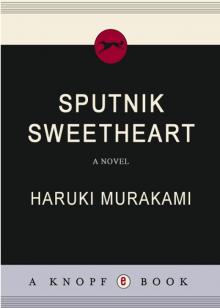 Sputnik Sweetheart
Sputnik Sweetheart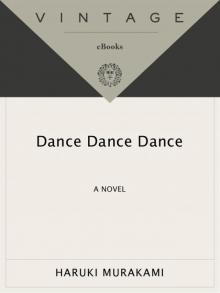 Dance Dance Dance
Dance Dance Dance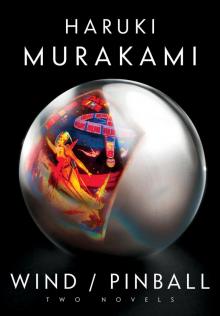 The Wind (1) and Up Bird Chronicle (2)
The Wind (1) and Up Bird Chronicle (2) Blind Willow, Sleeping Woman
Blind Willow, Sleeping Woman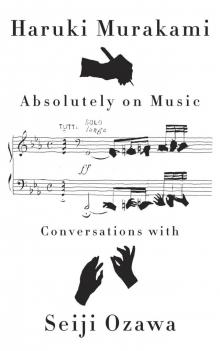 Absolutely on Music: Conversations With Seiji Ozawa
Absolutely on Music: Conversations With Seiji Ozawa Norwegian Wood
Norwegian Wood South of the Border, West of the Sun
South of the Border, West of the Sun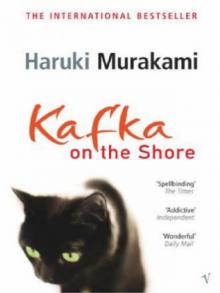 Kafka on the Shore
Kafka on the Shore Men Without Women
Men Without Women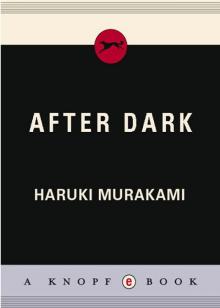 After Dark
After Dark Hard-Boiled Wonderland and the End of the World
Hard-Boiled Wonderland and the End of the World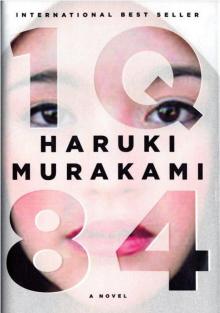 1q84
1q84 The Wind-Up Bird Chronicle
The Wind-Up Bird Chronicle Underground: The Tokyo Gas Attack and the Japanese Psyche
Underground: The Tokyo Gas Attack and the Japanese Psyche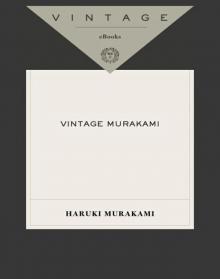 Vintage Murakami
Vintage Murakami The Elephant Vanishes: Stories
The Elephant Vanishes: Stories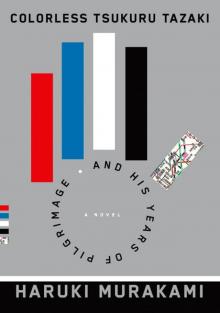 Colorless Tsukuru Tazaki and His Years of Pilgrimage
Colorless Tsukuru Tazaki and His Years of Pilgrimage First Person Singular
First Person Singular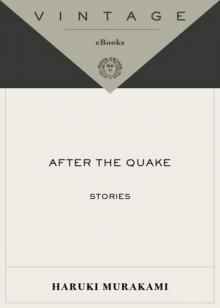 After the Quake
After the Quake A Wild Sheep Chase
A Wild Sheep Chase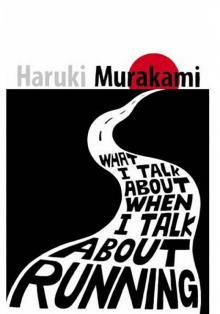 What I Talk About When I Talk About Running
What I Talk About When I Talk About Running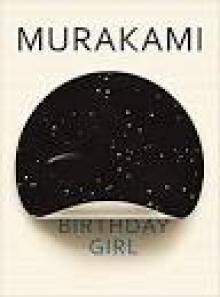 Birthday Girl
Birthday Girl The Elephant Vanishes
The Elephant Vanishes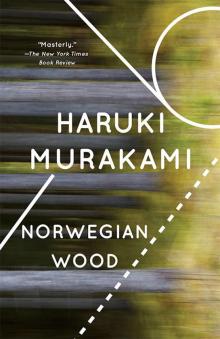 Norwegian Wood (Vintage International)
Norwegian Wood (Vintage International)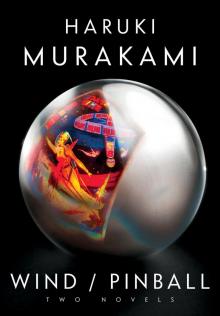 Wind/Pinball
Wind/Pinball Norwegian Wood Vol 1.
Norwegian Wood Vol 1. Underground
Underground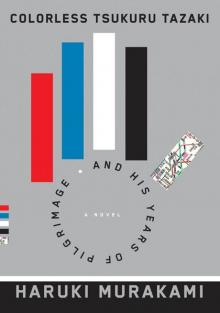 Colorless Tsukuru Tazaki and His Years of Pilgrimage: A novel
Colorless Tsukuru Tazaki and His Years of Pilgrimage: A novel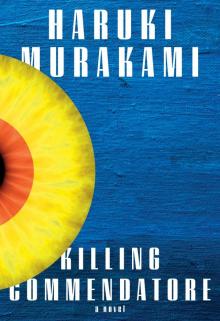 Killing Commendatore
Killing Commendatore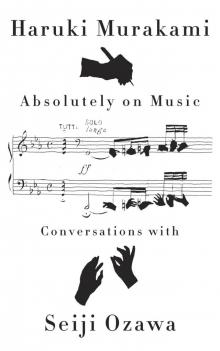 Absolutely on Music
Absolutely on Music